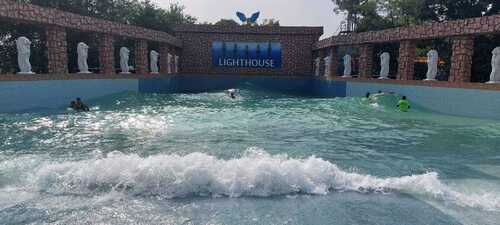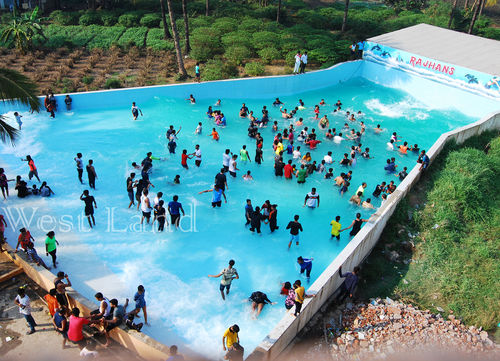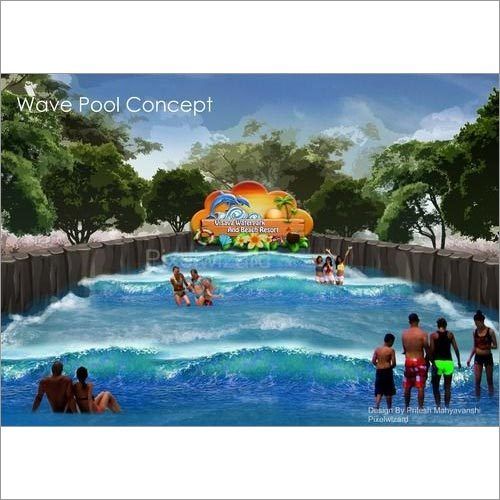Wave Pool Equipment
Product Details:
Wave Pool Equipment Price And Quantity
- 1 Set
- 1500000 INR/Set
Wave Pool Equipment Trade Information
- Cash Advance (CA) Cash in Advance (CID)
- 1 Set Per Month
- 30 Week
- as per requirements
- Chandigarh Himachal Pradesh Andaman and Nicobar Islands Pondicherry Uttarakhand Daman and Diu Dadra and Nagar Haveli Lakshadweep Nagaland Tripura Punjab East India Bihar Jharkhand Madhya Pradesh West Bengal Meghalaya Tamil Nadu Jammu and Kashmir Mizoram Assam Karnataka Haryana Sikkim Rajasthan Goa Telangana Delhi Manipur Gujarat Arunachal Pradesh West India South India Maharashtra North India Andhra Pradesh Kerala Central India Odisha Chhattisgarh Uttar Pradesh All India
Product Description
An inground wave water pool is a specialized type of swimming pool designed to simulate ocean waves, providing an exciting and dynamic aquatic experience for users. These pools are typically constructed below ground level, creating a seamless and natural look that integrates well with the surrounding landscape.
Features of an Inground Wave Water Pool:
-
Wave Generation System: The core feature of an inground wave water pool is its wave generation system, which can create various wave patterns and intensities. This system can include pneumatic pumps, hydraulic systems, or mechanical devices that displace water to create waves.
-
Design and Construction: Inground wave pools are built with durable materials like reinforced concrete, ensuring longevity and the ability to withstand the constant movement of water. The design often includes a sloping bottom that mimics a natural beach, enhancing the wave effect.
-
Size and Shape: These pools can vary in size, from small backyard installations to large commercial wave pools found in water parks. The shape can also be customized to fit the available space and desired aesthetic.
-
Control Systems: Modern inground wave pools are equipped with advanced control systems that allow operators to adjust wave height, frequency, and type. This customization ensures that the pool can cater to different skill levels and preferences.
-
Filtration and Water Treatment: Efficient filtration and water treatment systems are essential to maintain water quality and hygiene. These systems help remove debris, balance pH levels, and ensure safe swimming conditions.
-
Safety Features: Safety is a top priority, so inground wave pools are designed with features such as non-slip surfaces, secure railings, and well-marked depth indicators. Lifeguard stations and emergency stop mechanisms for the wave generation system are also common in larger installations.
-
Recreational and Therapeutic Uses: Inground wave water pools offer recreational fun for families and thrill-seekers, providing an environment for body surfing, boogie boarding, and general play. They can also have therapeutic benefits, as the motion of the waves can be relaxing and beneficial for physical therapy.
Applications:
- Residential: Homeowners can install smaller inground wave pools for personal use, creating a unique backyard feature that adds value to the property and provides endless entertainment.
- Commercial: Water parks and resorts use larger inground wave pools to attract visitors and enhance their offerings, providing a key attraction that draws large crowds.
- Rehabilitation Centers: Some facilities use wave pools for physical therapy and rehabilitation, leveraging the gentle movement of water to aid in recovery and muscle strengthening.
FAQs About Inground Wave Water Pools
1. What is an inground wave water pool?An inground wave water pool is a type of swimming pool installed below ground level that features a wave generation system to create artificial waves, simulating the experience of ocean waves.
2. How does the wave generation system work?Wave generation systems in these pools typically use pneumatic pumps, hydraulic systems, or mechanical devices to displace water and create waves. The specific technology and mechanisms can vary based on the pool's design and intended wave effects.
3. What are the benefits of an inground wave water pool?Inground wave pools provide unique recreational opportunities, simulate ocean experiences, and can be used for both fun and therapeutic purposes. They are attractive features for residential properties and commercial venues like water parks and resorts.
4. How much does it cost to build an inground wave water pool?The cost can vary widely based on size, design, materials, and the complexity of the wave generation system. A small residential wave pool might cost between $50,000 to $100,000, while larger commercial installations can cost several hundred thousand dollars or more.
5. How do you maintain an inground wave water pool?Maintenance includes regular cleaning, checking and balancing water chemistry, inspecting and servicing the wave generation system, and ensuring that filtration and water treatment systems are functioning correctly. Routine maintenance helps keep the pool safe and operational.
6. Are inground wave water pools safe?Yes, they are designed with safety in mind. Features often include non-slip surfaces, secure railings, depth markers, and emergency stop mechanisms for the wave system. Proper supervision and adherence to safety guidelines are crucial.
7. Can I adjust the wave patterns in my pool?Modern inground wave pools come with control systems that allow users to adjust wave height, frequency, and type. This customization makes it possible to cater to different preferences and skill levels.
8. What size wave pool do I need for my backyard?The size of the wave pool depends on the available space and your intended use. Smaller residential wave pools can fit in typical backyard spaces, but it's essential to consult with a pool designer to determine the best size and configuration for your needs.
9. How long does it take to install an inground wave water pool?Installation time can vary based on the pool's size and complexity. A small residential pool might take a few months to design and install, while larger commercial projects could take six months to a year or more.
10. Do inground wave pools require special permits?Yes, installing an inground wave pool usually requires permits from local authorities. These permits ensure that the pool meets safety and construction standards. It's important to check local regulations and work with a reputable contractor.
11. Can inground wave pools be heated?Yes, inground wave pools can be equipped with heating systems to maintain a comfortable water temperature year-round. This can be especially beneficial in cooler climates.
12. What types of waves can be generated?Wave generation systems can produce various types of waves, including gentle rolling waves, stronger surf-like waves, and customized patterns. The specific wave types depend on the pool's design and the capabilities of the wave generation system.
13. How do I choose a contractor for building an inground wave pool?Look for contractors with experience in building wave pools, check references, review previous projects, and ensure they are licensed and insured. A good contractor will help guide you through the design and installation process.
14. Are there energy-efficient options for wave generation systems?Yes, some wave generation systems are designed to be energy-efficient, using advanced technologies to reduce energy consumption. Consulting with a pool specialist can help identify energy-efficient options.
15. Can inground wave pools be used year-round?With proper heating and maintenance, inground wave pools can be used year-round, even in colder climates. Enclosures or indoor installations can also extend the usable season.






 WEST LAND CORPORATION
WEST LAND CORPORATION